OPINION
The theft of the next election is already under way
By MARK M. McDERMOTT
(April 12, 2017) — If you care about our democracy, our nation, fair elections, the right of the people to fairly choose our elected officials, and our future, you should be paying close attention to the systematic efforts of the Trump regime, Corporate America and their Republican allies to steal the 2018 and 2020 elections. Regardless of the issues you care about, you should care about fair elections. Stolen national elections in 2018 and 2020 will have a devastating effect on you, those you love and the issues you care about. This renewed effort is a continuation of a decades-long strategy.
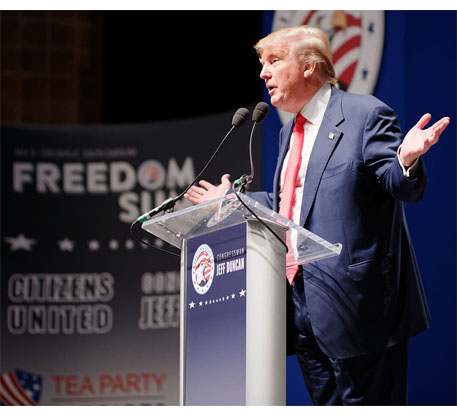 The attempted grand theft of these elections started on Nov. 27, 2016, when Trump began his “big lie” propaganda campaign about a stolen election by stating: “In addition to winning the Electoral College by a landslide, I won the popular vote if you deduct the millions of people who voted illegally.”
The attempted grand theft of these elections started on Nov. 27, 2016, when Trump began his “big lie” propaganda campaign about a stolen election by stating: “In addition to winning the Electoral College by a landslide, I won the popular vote if you deduct the millions of people who voted illegally.”
Trump has steadfastly refused to demonstrate the truth of his “Big Lie.” In response to growing challenges to his lying, Trump said: “You know what is important. Millions of people agree with me when I say that.”
Yes, they were ignorantly believing his “Big Lie.”
On Jan. 27, 2017, with no proof on any serious voter fraud, Vice President Pence laid out their strategy to steal the election in 2020: We need “a full evaluation of the voting rolls in the country and to protect the overall integrity of the voting system.”
With overwhelming evidence that major voter fraud is not taking place, what is their deeper motive? To restrict voting rights of millions of Americans and legally steal our elections by diluting the voting power of those opposed to their radical policy agenda.
This is not a new idea. Our nation’s history of voter suppression and stealing elections is long and ugly. Consider Mississippi. In the late 1880s, a bi-racial coalition of Republicans and Populists won the governor’s race and the state house. This coalition was made up of many poor black and white farmers and workers who deeply resented the economic and political domination of the wealthy planter class.
The ruling elites in the South understood that growing class unity of black and white farmers and workers had to be crushed to ensure their continued domination. This threat would spark a vicious, violent and successful white supremacist anti-democratic backlash. Crushing democracy, committing violence and championing white supremacy were the roads to success.
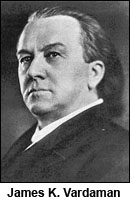 James K. Vardaman, Governor and U.S. Senator from Mississippi, said it best:
James K. Vardaman, Governor and U.S. Senator from Mississippi, said it best:
“Mississippi’s constitutional convention of 1890 was held for no other purpose than to eliminate the ni–er from politics… Let the world know it just as it is… In Mississippi we have in our constitution legislated against the racial peculiarities of the Negro… When that device fails, we will resort to something else. … If it is necessary every Negro in the state will be lynched; it will be done to maintain white supremacy.”
The U.S. Supreme Court ruled unanimously that the new constitution was legal.[1] The impact was extraordinary. Between 1876 and 1920, voter participation fell from 70% to 10%.[2] Virtually all blacks and most poor whites were disenfranchised. By 1940, less than 1% of voting age blacks were registered to vote.
Governor Vardaman’s threats of violence came true. In 1919, the National Association of the Advancement of Colored People reported 3,224 lynchings in the U.S. in the previous 30 years.[3] Mississippi led the nation. The vast majority of the victims were black. No one was convicted. The states which led the racist stealing of the right to vote successfully prevented Congress from passing an anti-lynching law as state officials would not crack down on the racist terror and violence.
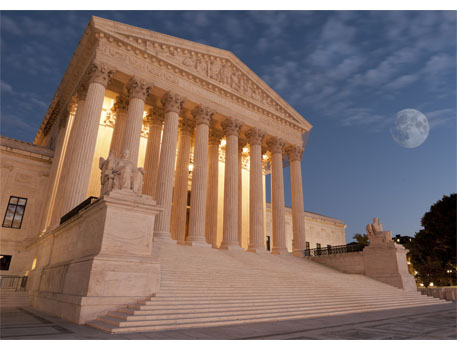 Democracy was killed in Mississippi with the full support of the U.S. Supreme Court. This pattern was repeated across the South to ensure white supremacy but also supremacy of wealthy whites and their corporate allies. This catastrophic loss of democracy in the South harmed working people, people of color, women and immigrants all over the country as the Congress would block much progressive legislation that would have improved the lives of all Americans.
Democracy was killed in Mississippi with the full support of the U.S. Supreme Court. This pattern was repeated across the South to ensure white supremacy but also supremacy of wealthy whites and their corporate allies. This catastrophic loss of democracy in the South harmed working people, people of color, women and immigrants all over the country as the Congress would block much progressive legislation that would have improved the lives of all Americans.
The death of democracy in the South would remain unchanged until the great non-violent uprising of the civil rights movement in the 1950s and 1960s. The civil rights movement led by courageous and heroic black people and their white allies would fundamentally change our democracy. It would also produce a powerful nationwide decades-long, right-wing, corporate-funded attack on hard-won voting rights.
Dr. King’s eloquence words in his 1957 “Give Us the Ballot” speech expressed the profound desires for greater justice in our nation:
“So long as I do not firmly and irrevocably possess the right to vote I do not possess myself. I cannot make up my mind — it is made up for me. I cannot live as a democratic citizen, observing the laws I have helped to enact — I can only submit to the edict of others.”
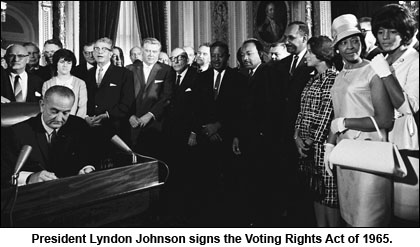 In 1965, the civil rights movement triumphed with the passage of the Voting Rights Act (VRA) which strengthened our nation’s commitment to making the right to vote real for millions of citizens of color who had been denied their constitutional right to vote for many decades. President Lyndon Johnson said: “The vote is the most important instrument ever devised by man for breaking down injustice.[4]
In 1965, the civil rights movement triumphed with the passage of the Voting Rights Act (VRA) which strengthened our nation’s commitment to making the right to vote real for millions of citizens of color who had been denied their constitutional right to vote for many decades. President Lyndon Johnson said: “The vote is the most important instrument ever devised by man for breaking down injustice.[4]
I agree with him. But what did the right to vote mean?
Four years later, U.S. Supreme Court Chief Justice Earl Warren clarified this key question: “The Voting Rights Act was aimed at the subtle, as well as the obvious, state regulations which have the effect of denying citizens their right to vote because of their race. The right to vote can be affected by the dilution of voting power, as well as by absolute prohibition on casting a ballot.”[5]
His reasoning is critical to understand. A citizen has the right to cast a ballot but also to participate in elections in which his/her voting power is not diminished by illegal manipulation of the elections by government officials.
We the people had won a history-changing democracy-expanding victory, but the resistance would grow. For decades, racist opponents of black voting rights used crude direct racism to win their fights. By the 1960’s this overt bigotry would not work.
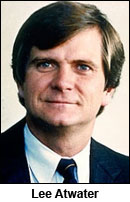 Lee Atwater, Republican National Committee chair and chair of George H.W. Bush’s 1988 campaign, eloquently expressed this shift in strategy:
Lee Atwater, Republican National Committee chair and chair of George H.W. Bush’s 1988 campaign, eloquently expressed this shift in strategy:
“You start out in 1954 by saying, ‘Ni–er, ni–er, ni–er.’ By 1968, you can’t say “ni–er” — that hurts you, backfires. So you say stuff like, uh, forced busing, and states’ rights… all these things you’re talking about are totally economic things and a byproduct of them is, blacks get hurt worse than whites.”
Extremely disgusting but brilliant. The bottom line was: Quit being an overt racist and become a secret bigot. Never show your overt racism. Talk in code and you can roll back the victories of people of color without showing who you really are. Ian Haney Lopez in the his brilliant book, Dog Whistle Politics, documents how this evolving strategy has been used to great success over the decades.
For the past 50-plus years, powerful right-wing and racist politicians and their corporate allies have fought a relentless war to undercut the right to vote and promoted elections that would diminish people of color’s voting power. In 1971, Lewis Powell wrote his famous memo “Attack on the American Free Enterprise System,” in which he outlined a grand decades-long strategy for Corporate America to reassert domination of our nation. Part of the emerging strategy was rolling back the democratic gains of the previous decades.
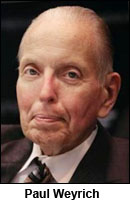 Paul Weyrich, co-founder of the Koch Brothers-funded Heritage Foundation, summed up their attitude and long-term goals: “I don’t want everybody to vote… our leverage in the elections quite candidly goes up as the voting populace goes down.”[6]
Paul Weyrich, co-founder of the Koch Brothers-funded Heritage Foundation, summed up their attitude and long-term goals: “I don’t want everybody to vote… our leverage in the elections quite candidly goes up as the voting populace goes down.”[6]
Weyrich’s goal of “causing voting populace to go down” can be achieved in three fundamental ways:
1. Convince people that voting doesn’t matter — “You know they are all crooks and liars and can’t be trusted to serve our interests;
2. Make it more difficult or impossible to vote; and
3. Change the voting rules so that particular groups of people are less able to elect people who are likely to care about their issues.
I want to focus on the last two. The Voting Rights Act of 1965 (VRA) was passed in response to decades of U.S. Supreme Court sanctioned state and local racist voting laws and practices that were openly and deliberately intended to prevent blacks from voting.
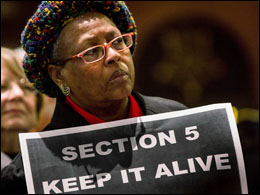 Congress added Section 5 which required that states and localities that had long histories of systemic racial bias in voting laws had to receive prior approval (“called preclearance”) before they could implement law and practice changes. Without this requirement, governments could keep passing new laws that violated the U.S. Constitution and the VRA and it would take years in court to strike them down. Section 5 put the burden of proof on the governments seeking changes to prove that their changes would not have a negative impact on voting rights of people of color. Let’s look at the results of the preclearance process.
Congress added Section 5 which required that states and localities that had long histories of systemic racial bias in voting laws had to receive prior approval (“called preclearance”) before they could implement law and practice changes. Without this requirement, governments could keep passing new laws that violated the U.S. Constitution and the VRA and it would take years in court to strike them down. Section 5 put the burden of proof on the governments seeking changes to prove that their changes would not have a negative impact on voting rights of people of color. Let’s look at the results of the preclearance process.
In 2006, the Republican-controlled Congress reauthorized the VRA by votes of 98-0 in the Senate and 390-33 in the House. Congress found the following that helped drive the overwhelming votes:
“DOJ (Department of Justice) objections blocked over 700 voting changes based on a determination that the changes were discriminatory. Congress found that the majority of DOJ objections including findings of discriminatory intent… and that the changes blocked by preclearance were ‘calculated decisions to keep minority voters from fully participating in the political process.'”
Congress also found that the number of state and local laws that were being blocked by the DOJ were increasing over time. Resistance to protecting voting rights was growing.
The crushing Republican electoral victories in 2010 opened the flood gates for new attacks on voting rights. In the subsequent five years, 395 new voting restrictions were proposed in 49 states.[7] As the 2016 election neared, 20 states had new restrictions in place since the 2010 elections.
The Trump regime and its allies are pushing the “Big Lie” of massive voter fraud. Let’s look at the evidence.
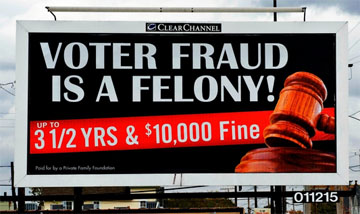 The Brennan Center for Justice published its seminal report, “The Truth About Voter Fraud,” which stated: “It is more likely that an American will be struck by lightning than that he will impersonate another voter at the polls.” The Washington Post reported in 2015 “found 31 credible cases of impersonation fraud from 2000 to 2014 out of 1 billion votes.” The Brennan Center website lists many other credible studies that debunk charges of widespread voter fraud.
The Brennan Center for Justice published its seminal report, “The Truth About Voter Fraud,” which stated: “It is more likely that an American will be struck by lightning than that he will impersonate another voter at the polls.” The Washington Post reported in 2015 “found 31 credible cases of impersonation fraud from 2000 to 2014 out of 1 billion votes.” The Brennan Center website lists many other credible studies that debunk charges of widespread voter fraud.
So with no credible evidence of widespread voter fraud, what are the right-wing, anti-democratic elected officials doing with election laws? This is part of their emerging strategy:
1. Ten states had stricter ID laws.
2. Seven states made it hard to register to vote.
3. Six states cut back on early voting days.
4. Three states made it harder for felons to regain voting rights.
What public purpose is served by making it harder to register to vote, or cutting back on the number of early voting days which allow voters to vote before Election Day? There is no valid public purpose.
Here are two quick examples of the many ways fair elections are being undermined:
1. On March 20, 2017, federal judges in Texas ruled that the 2010 Republican controlled congressional redistricting “‘intentionally diluted minority voting strength to gain partisan advantage’… The court found that Texas Republicans unnecessarily concentrated minority voters in certain districts to reduce their influence statewide while diluting minority representation in other districts.”
2. New research on strict voter ID laws show the following: “Strict ID laws doubled the turnout gaps between whites and Latinos in the general elections, and almost doubled the white-black turnout gap in primary elections.”
Decades ago, the anti-democratic and racist politicians were blatant about denying the right to vote to blacks and other people of color. They have gotten smarter. Talk in code, don’t be blatantly racist as that hurts their efforts but systematically work to undercut the democratic voting rights of people of color and others. Still vicious, still undemocratic and still racist but subtle and clever.
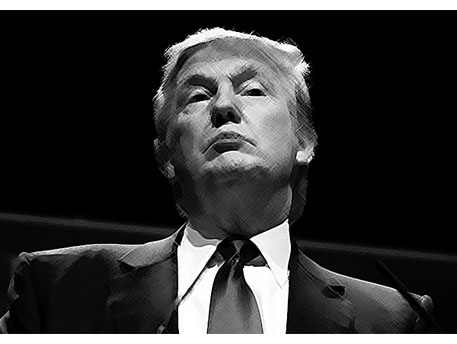 Where are we headed with Republican and their corporate allies attempting to steal the next presidential election?
Where are we headed with Republican and their corporate allies attempting to steal the next presidential election?
Trump lost the national presidential popular vote by 2.8 million. He claims he lost due to massive voter fraud by millions of undocumented immigrants. It is specifically designed to stir up hatred toward people of color and immigrants. He has no evidence and now his administration wants an investigation of the national voting system. The next step will be to call for an overhaul our nation’s voting system.
Why? They want to deny the right to vote of millions of our citizens who are disproportionately people of color, immigrants, lower income voters, students and the young who are more supportive of the Democrats. In short they want to “legally steal” the election.
Pay close attention to this issue and support efforts to protect and expand our right to vote and fair elections. Our nation’s future depends on it.
 Mark McDermott is an economic justice educator and writer who has been a political activist for many years working on economic, racial and social justice. Find him on Facebook or visit his website at www.markmmcdermott.com.
Mark McDermott is an economic justice educator and writer who has been a political activist for many years working on economic, racial and social justice. Find him on Facebook or visit his website at www.markmmcdermott.com.
[1] McMillen, James, Dark Journey: Black Mississippians in the Age of Jim Crow, 1990, page 42.
[2] Woodward, Colin, American Nations, page 305.
[3] Finkelman, Paul, Thirty Years of Lynching in the United States, 1889-1918, 1919.
[4] Johnson, Lyndon, quoted in Berman, Ari, Give Us the Ballot, 2015, dedication page.
[5] Warren, U.S. Supreme Court Chief Justice Earl, quoted in Berman, Ari, Give Us the Ballot, 2015, 2015, page 63.
[6] Weyrich, Paul, quoted in McChesney, Robert, Digital Disconnect, 2013, page 59,
[7] Berman, Ari, Give Us the Ballot, page 10.





